AUnit3知识点归纳
英语必修三unit3知识点总结

英语必修三unit3知识点总结.doc英语必修三Unit 3知识点总结前言Unit 3作为英语必修三的重要组成部分,涵盖了丰富的语言知识点和文化背景知识。
本总结旨在帮助学生更好地理解和掌握本单元的核心内容。
第一部分:词汇学习1. 核心词汇Adjectives: beautiful, magnificent, unique, mysterious, ancient, traditional, cultural, historicalNouns: civilization, architecture, sculpture, painting, music, literature, philosophy, religionVerbs: admire, explore, create, preserve, appreciate, influence, develop, transform2. 短语搭配Explore the world: 探索世界Appreciate art: 欣赏艺术Influence culture: 影响文化Preserve history: 保护历史Develop skills: 发展技能第二部分:语法重点1. 被动语态被动语态的构成:be + past participle被动语态的使用:当动作的执行者不明确或不重要时2. 定语从句定语从句的引导词:who, whom, whose, which, that定语从句的作用:修饰先行词,提供更多信息3. 现在完成时现在完成时的形式:have/has + past participle现在完成时的用法:表示过去发生的动作对现在造成的影响或结果第三部分:阅读理解1. 文章结构标题:概括文章主题引言:介绍背景信息正文:详细阐述主题结尾:总结全文,提出观点或建议2. 阅读技巧快速阅读:获取文章大意精读:理解细节,分析作者意图推理判断:根据上下文推断词义或作者观点第四部分:写作技巧1. 写作结构引言:提出话题,吸引读者兴趣正文:分段落阐述观点,提供论据结尾:总结全文,提出个人看法或建议2. 写作技巧使用多样的句型和词汇注意段落之间的逻辑关系确保语法正确,拼写无误第五部分:文化背景知识1. 世界文化遗产介绍几个著名的世界文化遗产,如中国的长城,埃及的金字塔等探讨文化遗产对现代社会的影响2. 艺术与文化讨论不同艺术形式如何反映和塑造文化分析艺术与文化之间的关系第六部分:综合运用1. 口语表达练习描述文化遗产和艺术作品讨论文化遗产保护的重要性2. 听力理解听有关文化遗产和艺术的讲座或访谈练习捕捉关键信息,理解主旨大意结语Unit 3的学习不仅要求学生掌握语言知识,更要求学生能够理解和欣赏文化多样性。
UNIT 3 复习知识点

1. used to + do sth 表示过去怎样;过去常常做某事。 注意 :used to + do sth 的否定形式: didn’t use to + do sth (或 used not to ) 疑问形式: Did you use to do sth? Yes ,I did /No, I didn’t. 拓展:1)be used to do sth为被动语态。意为“被用来…” 2)be used to +doing sth 习惯做某事 2. be terrified of 是……” = be afraid of “害怕……” be terrified to do sth = be afraid to do sth . “不敢做某事” 3. with +n adj /adv/ 介词短语… with my bedroom light on 意为“开着卧室的灯”,表示伴随的一 种状态,是的with一种复合结构形式, 4. (1) 花费时间 : spend some time (in) doing spend some time on sth 拓展:也可与 take 互换。It takes sb. some time to do sth. (2)花费金钱: spend some money on sth. 拓展: 花费金钱还 可用 cost , pay…for 互换。 (3) 另外,spend 也有“度过”的意思。spend their summer holiday
5. (1)no longer (=not…any longer ) ,主要是用 来表示时间或距离的“不再”. ( 2 ) no more (=not …any more) ,主要用来表示 数量和程度,表达 never again或“没有更多” 的含义。 6..in the last/past + 一段时间 表示:在过去的一 段时间里,它常与现在完成时态连用。 7. a fifteen-year-old boy 类似的还有:十分钟的路程a ten-minute walk 两个月的假期 a two-month holiday 一个八十岁的老太太an eighty-year-old woman 8. afford ----can/can’t + afford+to do sth 有/没 有复习
九年级英语unit3知识点归纳
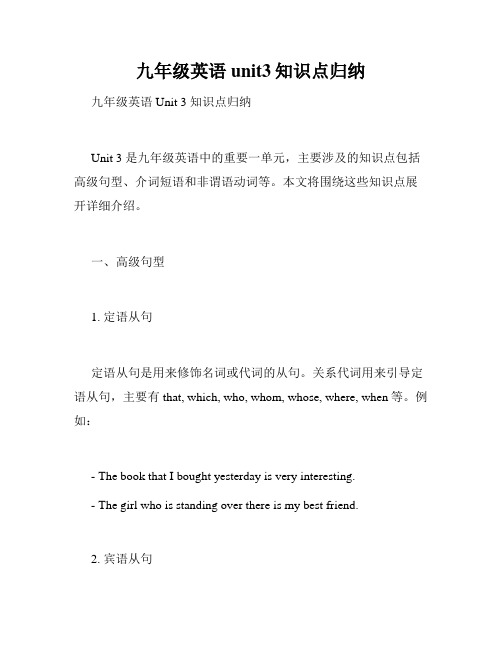
九年级英语unit3知识点归纳九年级英语Unit 3 知识点归纳Unit 3 是九年级英语中的重要一单元,主要涉及的知识点包括高级句型、介词短语和非谓语动词等。
本文将围绕这些知识点展开详细介绍。
一、高级句型1. 定语从句定语从句是用来修饰名词或代词的从句。
关系代词用来引导定语从句,主要有that, which, who, whom, whose, where, when等。
例如:- The book that I bought yesterday is very interesting.- The girl who is standing over there is my best friend.2. 宾语从句宾语从句是在主句中作为宾语的从句。
常用的引导词有that, whether, if等。
例如:- I don't know if it will rain tomorrow.- She asked me whether I had finished my homework.3. 状语从句状语从句是用来修饰主句的副词从句,常用的引导词有when, while, after, before, since, until等。
例如:- He always listens to music while he is doing his homework.- I will call you back as soon as I finish my work.二、介词短语介词短语在句中起着修饰或者指示的作用,可以表达时间、地点、原因、方式等。
常见的介词短语有at, in, on, of, for, with, by等。
例如:- I will meet you at the park tomorrow.- She is good at playing the piano.三、非谓语动词非谓语动词是指在句子中作为非主谓部分的动词形式,包括动词不定式、动名词和现在分词。
七年级上册英语Unit3知识点总结
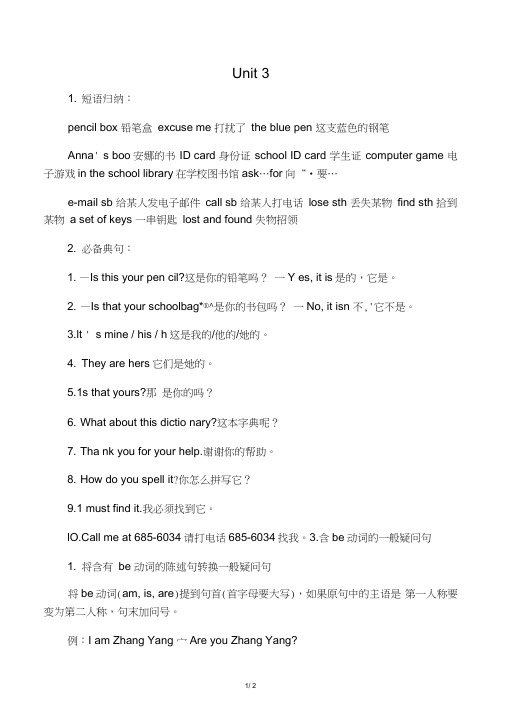
Unit 31. 短语归纳:pencil box 铅笔盒excuse me 打扰了the blue pen 这支蓝色的钢笔Anna' s boo安娜的书ID card 身份证school ID card 学生证computer game 电子游戏in the school library在学校图书馆ask…for向“•要…e-mail sb 给某人发电子邮件call sb 给某人打电话lose sth 丢失某物find sth 拾到某物a set of keys 一串钥匙lost and found 失物招领2. 必备典句:1. —Is this your pen cil?这是你的铅笔吗?一Y es, it is是的,它是。
2. —Is that your schoolbag*®^是你的书包吗?一No, it isn 不,'它不是。
3.lt ' s mine / his / h这是我的/他的/她的。
4. They are hers它们是她的。
5.1s that yours?那是你的吗?6. What about this dictio nary?这本字典呢?7. Tha nk you for your help.谢谢你的帮助。
8. How do you spell it?你怎么拼写它?9.1 must find it.我必须找到它。
lO.Call me at 685-6034请打电话685-6034找我。
3.含be动词的一般疑问句1. 将含有be 动词的陈述句转换一般疑问句将be动词(am, is, are)提到句首(首字母要大写),如果原句中的主语是第一人称要变为第二人称,句末加问号。
例:I am Zhang Yang 宀Are you Zhang Yang?That is my bike f Is that your bike?2. 含有be 动词的一般疑问句的肯定回答与否定回答肯定回答:Yes主语+ be否定回答:No主语+ be例:—Is this your pen?—Yes, it is / No, it isn ' t.4.1 must find it.我必须找到它。
六年级英语Unit3 知识点归纳

第三单元知识点归纳一、习惯搭配/短语运动会:1.sports day 运动会 2. high jump跳高3. jump high 跳得高4.win a prize 获奖5. win the race赢得比赛6. in the first race在第一场比赛中7. in the competition 在比赛中8. have a swimming race进行游泳比赛周末活动:9. go swimming去游泳10. take a walk散步11. read a book看书12. visit a friend拜访朋友13.clean the room打扫房间14.play with friends和朋友玩15.play football踢足球其他:16. decide to do sth.决定做某事17.knock the door敲门二、公式化句型1、询问“谁是第……名?”的句型及答语问句:Who was/were/came + 序数词?(first 第一,second 第二,third第三,fourth第四,fifth第五,sixth第六,seventh 第七,eighth第八,ninth 第九,tenth第十……)答语:主语+ was/were/came + 序数词2、询问某人过去是否做了某事的句型及其答语问句:Did + 主语+ 动词原形+ 其他?“……了吗?”Yes,主语+ did.“是的,……了。
”No,主语+ didn’t. “不,……没……”基变序,有规律,词尾加上th;一、二、三,特殊记,词尾字母t,d,d;八去t,九去e,ve要用f替;ty将y变成i,th前面有个e;若是碰到几十几,前用基来后用序。
九上英语unit3知识点总结
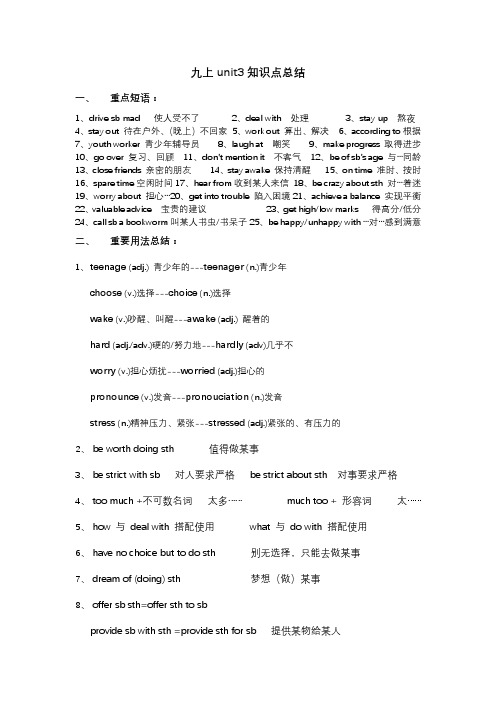
九上unit3知识点总结一、重点短语:1、drive sb mad 使人受不了2、deal with 处理3、stay up 熬夜4、stay out 待在户外、(晚上)不回家5、work out 算出、解决6、according to根据7、youth worker 青少年辅导员8、laugh at 嘲笑9、make progress 取得进步10、go over 复习、回顾11、d on’t mention it不客气12、be of sb’s age与…同龄13、close friends 亲密的朋友14、stay awake 保持清醒15、on time 准时、按时16、spare time空闲时间17、hear from收到某人来信18、be crazy about sth 对…着迷19、worry about 担心…20、get into trouble 陷入困境21、achieve a balance 实现平衡22、valuable advice 宝贵的建议23、get high/low marks 得高分/低分24、call sb a bookworm叫某人书虫/书呆子25、b e happy/unhappy with …对…感到满意二、重要用法总结:1、teenage(adj.) 青少年的---teenager (n.)青少年choose (v.)选择---choice (n.)选择wake (v.)吵醒、叫醒---awake (adj.) 醒着的hard (adj./adv.)硬的/努力地---hardly (adv)几乎不worry (v.)担心烦扰---worried (adj.)担心的pronounce (v.)发音---pronouciation (n.)发音stress (n.)精神压力、紧张---stressed (adj.)紧张的、有压力的2、be worth doing sth 值得做某事3、be strict with sb 对人要求严格be strict about sth 对事要求严格4、too much +不可数名词太多…… much too + 形容词太……5、how 与deal with 搭配使用what 与do with 搭配使用6、have no choice but to do sth 别无选择,只能去做某事7、dream of (doing) sth 梦想(做)某事8、offer sb sth=offer sth to sbprovide sb with sth =provide sth for sb 提供某物给某人9、hope to do sth 希望去做某事(没有hope sb to do sth 这种用法)10、spend time on/doing sth 花费时间在某事上/做某事11、in Year 9=in Grade 9=in the 9th grade 在九年级12、allow sb to do sth 允许某人做某事allow doing sth 允许做某事13、look forward to doing sth 期望做某事三、重点语法:1、宾语从句:①连接词:that、if/whether、特殊疑问词②语序:陈述语序。
新人教版七年级(上册)Unit 3 知识点总结

新人教版七年级(上册)Unit 3 知识点总结Unit 3 My School一、课内短语归纳1. dining hall 餐厅2. in front of在……(外部的)前面3. in the front of在……(内部的)前面4. across from 在对面5. sports field 运动场6. put up 张贴;搭建7. desk drawer 书桌抽屉8. at the back(of) 在(…)后面9. reading corner 阅读角10. in the corner of 在……的角落里11. on/at the corner of 在…的转角处12. be famous as 作为…而出名13. be famous for因……而出名14. at school在学校15. be different from与……不一样16. do exercises 做体操17. change seats 换座位18. similar to类似的;相像的19. sounds fun 听起来很有趣20. tell sb(not)to do sth告诉某人(不要)做某事21. tell sb about sth 告诉某人关于某事22. bye for now再见23. most of.………的大多数/大部分24. How about ...? ...怎么样?25. share with a partner 和同伴分享26. raise the flag 升旗27. welcome to our school 欢迎来到我们学校28. show sb. around 带某人四处参观二、必背经典句1. --Where’s the dining hall? 餐厅在哪里?--It’s in front of the art building. 它在艺术楼前面。
2. --Is there a gym in this school? 学校里有体育馆吗?--Yes, there is./ No, there isn’t. 是的,有。
小学六年级英语上册知识点归纳Unit3

小学六年级英语上册知识点归纳Unit3小学六年级英语上册知识点归纳Unit3Unit 3 What are you going to do ?一、重点短语:this morning 今天上午 this afternoon 今天下午 this evening 今天晚上next week 下周 tomorrow 明天 tonight 今晚post card 明信片 comic book漫画书 newspaper报纸二、重点句型:1.What are you going to do on the weekend?你周末打算做什么?2.I’m going to visit my grandparents this weekend?这个周末我打算去看望我的外祖父母。
3.Where are you going this afternoon? 你今天下午打算去哪里?4.I’m going to the bookstore.我打算去书店。
5.What are you going to buy?你打算去买什么?6.I’m going to buy a comic book.我打算去买一本漫画书。
三、重点语法:1、What are you going to do?你想做什么?询问他人在未来的打算。
be going to 后面要跟动词的原形。
注意be going to be 意思是"打算成为什么,干什么职业。
"注意一下句子的区别,找出正确回答。
What are you going to do this afternoon?What are you going tobuy?What are you going to be?When? are you going?Where are you going?How are you going?Who are you going with?2、this evening 和tonight的区别:this evening指的是今天晚上睡觉以前的时间,一般指晚上十二点以前。
人教版英语九年级全册Unit3 单元知识点归纳

Unit3 单元知识点归纳一、重点词汇:stamp rush suggest mail convenient politely polite impolite request direction correct speaker二、短语:1. excuse me 劳驾,请原谅,打搅2. get to 到达3. get some magazines 得到一些杂志4. have dinner 吃晚餐5. get some information about 获取有关…….的一些信息6. a pair of 一双,一对,一副7. on one’s / the right 在右边8. turn left / right 向左/ 右拐9. between…..and….. 在…..和…..之间10. go past 经过,路过11. come on 快点儿,过来,加油12. on one’s way to 在某人去…….的路上13. a little earlier 早点儿14. the shopping center 购物中心15. a good place to eat 一个吃饭的好地方16. the corner of …….的角落/ 拐角处17. in different situations 在不同的情况下18. lead in to 导入,引入19. on time 准时,按时20. look forward to 盼望,期待21. pardon me 什么,请再说一遍三、固定短语:1. not…..until…… 直到…..才……2. Let’s do sth. 让我们做某事吧3. start doing sth. 开场做某事4. spend time doing sth. 花费时间做某事5. thank sb. for (doing) sth. 为〔做〕某事而感谢某人6. would like to do sth. 想要做某事7. look forward to doing sth. 盼望,期待做某事四、重点句型:1. Excuse me, could you please tell me how to get to the bookstore?打搅一下,请你告诉我如何去书店好吗?2. Excuse me, do you know where I can get some postcards?请问,你知道在哪里可以买到一些明信片吗?3. I wonder where we should go next.我想知道接下来我们应该去哪儿。
人教版四年级英语下册Unit 3 Weather(天气)知识点归纳

It's 26 degrees.
它是26度。
5、Is it开头的一般疑问句
Is it sunny?
天气晴朗吗?
Yes,it is.
是的,它是。
No,it isn't.
不,它不是。
6、动词开头的祈使句
Put on a hat.
戴上帽子。
Take off your shoes.
脱下你的鞋子。
rainy 下雨的
windy有风的
cloudy 多云的
weather report天气预报
二、重点句型
1、征求他人意见
Can Igoes,you can.
是的,你能出去。
No,you can't.
不,你不能出去。
2、询问天气
What's the weather likein New york?
纽约的天气怎么样?
It's cool and rainy.
是凉爽的和下雨的。
3.猜测天气
Is itsunny in Beijing?
北京是晴朗的吗?
yes,it is.
是的。
No,it isn’t.
不是的。
4.It's开头的句型
It's cold outside.
外面是冷的。
It's warm inside.
人教版四年级英语下册Unit 3 Weather(天气)知识点归纳
人
教
版
四
年
级
英
语
下
册
Unit
3 Weather
天
气
知
识
点
归
Unit 3 知识点

Unit 3 Lesson 11. call sb. 打电话给某人call sb. About sth. 关于某事给某人打电话call sb back=return one’s call 给某人回电caller 打电话的人receiver 接电话的人answer the phone 接电话2. A:May I speak to Linda?B:Hold on. I’ll get her./Speaking/This is Linda speaking.3. A:May I speak to Linda?B:I am afraid she is out. May I take a message?4. A:She is out.B:Can I leave a message?A:Sure. Please go ahead.5. she is out.= She is not in.6. give sb the message= tell sb. the message7. message n.消息,信息messenger n.送信者8. organize v. 组织organization n. 组织、机构9. science n. 科学scientist n.科学家10. How about visiting(V.作动词用) Shanghai?= How about a visit(n. 做名词用) to Shanghai?11. find sth/sb. +adj. 发现某物/某人怎么样find it very interesting12. over 18= more than 18 18岁以上under18= less than 18 18岁以下Unit 3 Lesson 21. rich (a.富有的)---enrich (v.使丰富)enrich one’s knowledge 丰富某人的知识2. broad (a.宽阔的)---broaden (v.拓宽) broaden one’s mind 拓宽某人的视野3. on the twelfth floor 序数词前面要加themy brother’s twelfth birthday 当序数词前有修饰词时不要the4. a prize winner 一个获奖者5. program v. 编程computer programming电脑编程program n. 程序write computer programs 编写电脑程序6. take up sth. 开始从事…/对….开始感兴趣take up playing the pianotake it up7. collect v. 收集collection n. 收藏,收藏品。
英语必修一unit3知识点归纳
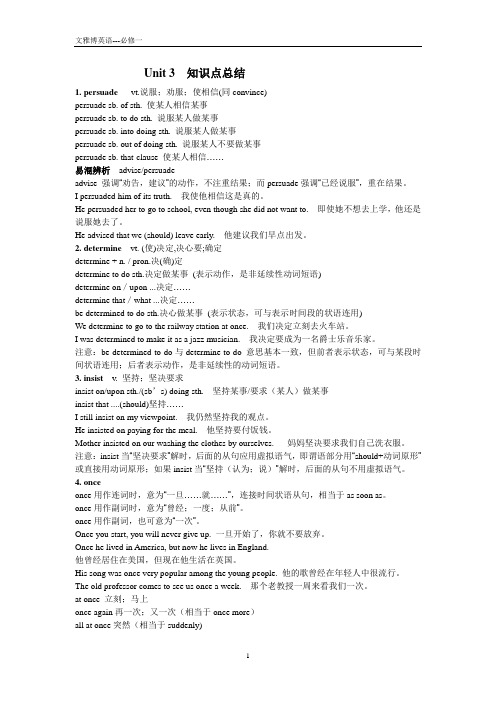
Unit 3 知识点总结1. persuade vt.说服;劝服;使相信(同convince)persuade sb. of sth. 使某人相信某事persuade sb. to do sth. 说服某人做某事persuade sb. into doing sth. 说服某人做某事persuade sb. out of doing sth. 说服某人不要做某事persuade sb. that-clause 使某人相信……易混辨析advise/persuadeadvise 强调“劝告,建议”的动作,不注重结果;而persuade强调“已经说服”,重在结果。
I persuaded him of its truth. 我使他相信这是真的。
He persuaded her to go to school, even though she did not want to. 即使她不想去上学,他还是说服她去了。
He advised that we (should) leave early. 他建议我们早点出发。
2. determine vt. (使)决定,决心要;确定determine + n. / pron.决(确)定determine to do sth.决定做某事(表示动作,是非延续性动词短语)determine on/upon ...决定……determine that/what ...决定……be determined to do sth.决心做某事(表示状态,可与表示时间段的状语连用)We determine to go to the railway station at once. 我们决定立刻去火车站。
I was determined to make it as a jazz musician. 我决定要成为一名爵士乐音乐家。
注意:be determined to do与determine to do 意思基本一致,但前者表示状态,可与某段时间状语连用;后者表示动作,是非延续性的动词短语。
unit3知识点
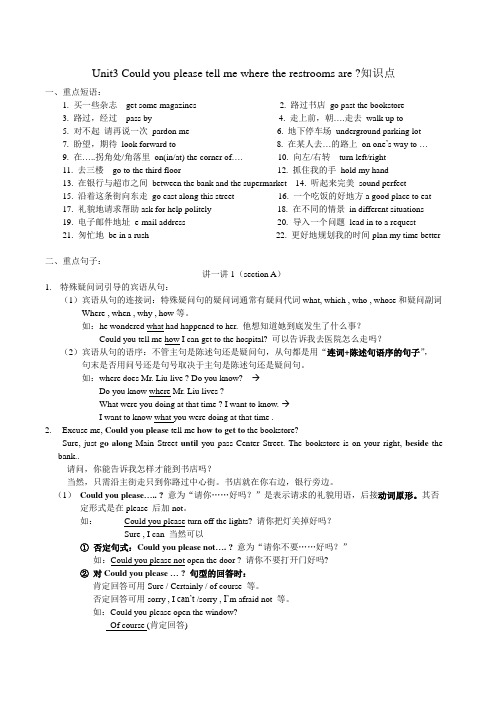
Unit3 Could you please tell me where the restrooms are ?知识点一、重点短语:1. 买一些杂志get some magazines2. 路过书店go past the bookstore3. 路过,经过pass by4. 走上前,朝….走去walk up to5. 对不起请再说一次pardon me6. 地下停车场underground parking lot7. 盼望,期待look forward to 8. 在某人去…的路上on one’s way to …9. 在…..拐角处/角落里on(in/at) the corner of…. 10. 向左/右转turn left/right11. 去三楼go to the third floor 12. 抓住我的手hold my hand13. 在银行与超市之间between the bank and the supermarket 14. 听起来完美sound perfect15. 沿着这条街向东走go east along this street 16. 一个吃饭的好地方a good place to eat17. 礼貌地请求帮助ask for help politely 18. 在不同的情景in different situations19. 电子邮件地址e-mail address 20. 导入一个问题lead in to a request21. 匆忙地be in a rush 22. 更好地规划我的时间plan my time better二、重点句子:讲一讲1(section A)1.特殊疑问词引导的宾语从句:(1)宾语从句的连接词:特殊疑问句的疑问词通常有疑问代词what, which , who , whose和疑问副词Where , when , why , how等。
如:he wondered what had happened to her. 他想知道她到底发生了什么事?Could you tell me how I can get to the hospital? 可以告诉我去医院怎么走吗?(2)宾语从句的语序:不管主句是陈述句还是疑问句,从句都是用“连词+陈述句语序的句子”,句末是否用问号还是句号取决于主句是陈述句还是疑问句。
Unit 3知识点归纳

1.That’s all right ,That’s right 和All rightThat’s all right .一般用于有礼貌地回答对方的歉意或感谢,意思是“不用谢;没关系;别客气”。
如:Thank you very much .非常感谢你。
That’s all right .别客气。
That’s right .一般用来表示认为对方的回答是对的,或同意别人所说的。
意思是“对,正确”。
如:I think you’re twelve .我想你有12岁了。
Yes, that’s rig ht .对,没错。
all right .好,行,不错。
如:How are you ? 你好吗?Oh, all right ,thanks .噢,没事,谢谢。
He’s all right now .他现在情况正常。
2.That’s OK.和That’s all right .(1)在接受他人的帮助和好意时,常说“Thanks”,”Many thanks “,”Thank you “,”Thank you very much ”等。
回答这些谢意时,常说“That’s OK”,”That’s all right “或“You’re welcome “等,意思是“没什么,不用谢”或“别客气”。
其中“That’s OK”是最随便的一种表达。
如:Thanks .多谢了。
That’s OK. 没什么。
Thank you very much .非常谢谢你。
That’s all right .不用谢。
(2)OK和All right 还可以用来回答对方的建议,如有人向你提议一块去散散步,你表示同意,说“OK”或“All right ”,意思是“行”或“好吧”。
如有人请你做某件事,你同意做也可以说“OK”或“All right”。
如:Please look at that picture .请看看那幅画。
OK/ All right .行/好吧。
Unit3Englisharoundtheworld重要知识点梳理汇总
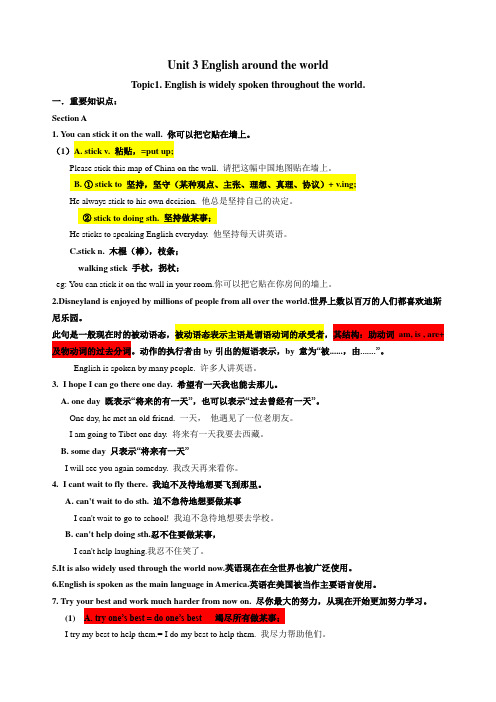
Unit 3 English around the worldTopic1. English is widely spoken throughout the world.一.重要知识点:Section A1. You can stick it on the wall. 你可以把它贴在墙上。
(1)A. stick v. 粘贴,=put up;Please stick this map of China on the wall. 请把这幅中国地图贴在墙上。
B. ① stick to 坚持,坚守(某种观点、主张、理想、真理、协议)+ v.ing;He always stick to his own decision. 他总是坚持自己的决定。
② stick to doing sth. 坚持做某事;He sticks to speaking English everyday. 他坚持每天讲英语。
C.stick n. 木棍(棒),枝条;walking stick 手杖,拐杖;eg: You can stick it on the wall in your room.你可以把它贴在你房间的墙上。
2.Disneyland is enjoyed by millions of people from all over the world.世界上数以百万的人们都喜欢迪斯尼乐园。
此句是一般现在时的被动语态,被动语态表示主语是谓语动词的承受者,其结构:助动词am, is , are+及物动词的过去分词。
动作的执行者由by引出的短语表示,by 意为“被......,由.......”。
English is spoken by many people. 许多人讲英语。
3. I hope I can go there one day. 希望有一天我也能去那儿。
A. one day 既表示“将来的有一天”,也可以表示“过去曾经有一天”。
Unit 3第三单元知识点总结

Unit 31.arrive at /in 到达get toreach2.be welcomed to do sth 欢迎做某事3.allow doing sth 允许做某事allow sb to do sth 允许某人做某事allow sb in/ out /here 允许某人在出去、进来、在这里4.by oneself=alone 独自5.apologize to sb=make an apology to sb 向某人道歉say sorry to sb6.lead sb to + 地点带领某人去某地7.fall asleep 入睡(表示状态)8.start to do /doing 开始做9.bark at sb 冲某人叫10.wake up 醒来wake sb up 叫醒某人11.with one’s help=with the help of sb 在某人的帮助下12.some time 一段时间13.some times 几次、几倍14.sometime 某时(用于过去或将来的不确定时间)15.sometimes 有时16.the bottom of ……的底部17.get down 蹲下、趴下、下车18.next to=beside 紧挨着、在……的旁边19.get out of 从……出来20.get ……out of 把……从……中弄出来21.finally=at last =in the end 最后22.both ……and …………和……都(两者)23.both of +代词/名词复数两者都24.had better do sth 最好做某事25.in front of 在……的前面(范围外)in the front of 在……的前面(范围内)26.between ……and ……在……和……之间27.all the way 一路28.as soon as 一……就29.step onto the beach 踏上岸边30.step into the room 踏进房间31.in public places 在公共场所32.follow the law 遵守法律。
人教版英语九年级Unit3单元知识点归纳
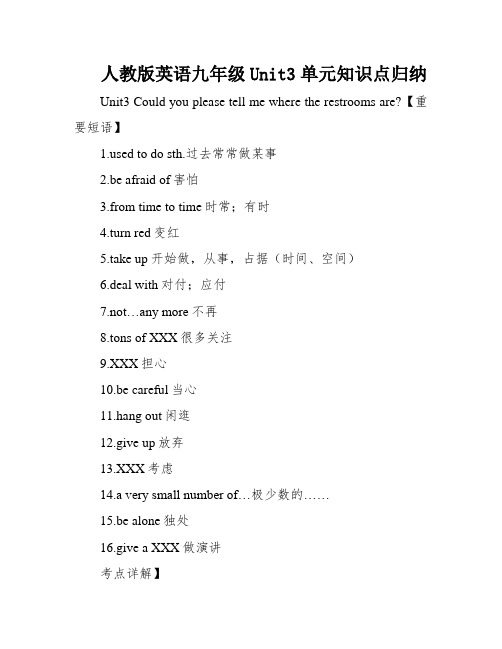
人教版英语九年级Unit3单元知识点归纳Unit3 Could you please tell me where the restrooms are?【重要短语】ed to do sth.过去常常做某事2.be afraid of害怕3.from time to time时常;有时4.turn red变红5.take up开始做,从事,占据(时间、空间)6.deal with对付;应付7.not…any more不再8.tons of XXX很多关注9.XXX担心10.be careful当心11.hang out闲逛12.give up放弃13.XXX考虑14.a very small number of…极少数的……15.be alone独处16.give a XXX做演讲考点详解】1.①问路常用的句子:Do you know where is…?Can you tell me how can I get to…?Could you tell me how to get to…?②Can/Could/Will/Would you please tell me sth.表示十分客气地询问事情③Could you tell me how to get to the park?请你告诉我怎么才能去邮局好吗?上面句子中的XXX是疑问词与动词不定式连用,用作宾语,但不是宾语从句(这一点要搞清楚,它不是宾语从句),相当于how I can get tothe park(宾语从句)I don't know how to solve the problem=I don't know how I can XXX.我不晓得若何办理这个题目Can you tell me when to leave。
=Can you tell me when I will leave?你能告诉我什么时候离开?2.一样平常社交用语:take the XXX乘电梯/自动扶梯到…楼turn left / right == take a left / right向左/右转go XXX向前直走(straight这个词经常考)3.next to中间、紧接着(常见短语)Lily is next to Ann.莉莉就在安的中间。
英语必修一unit3知识点归纳

Unit 3 知识点总结1. persuade vt.说服;劝服;使相信(同convince) persuade sb. of sth. 使某人相信某事使某人相信某事persuade sb. to do sth. 说服某人做某事persuade sb. into doing sth. 说服某人做某事说服某人做某事persuade sb. out of doing sth. 说服某人不要做某事说服某人不要做某事persuade sb. that-clause 使某人相信使某人相信……易混辨析advise/persuadeadvise 强调“劝告,建议”的动作,不注重结果;而persuade强调“已经说服”,重在结果。
,重在结果。
I persuaded him of its truth. 我使他相信这是真的。
我使他相信这是真的。
He persuaded her to go to school, even though she did not want to. 即使她不想去上学,他还是说服她去了。
说服她去了。
He advised that we (should) leave early. 他建议我们早点出发。
他建议我们早点出发。
2. determine vt. (使)决定,决心要;确定确定determine + n. / pron.决(确)定determine to do sth.决定做某事决定做某事 (表示动作,是非延续性动词短语) determine on/upon ...决定决定……determine that/what ...决定决定……be determined to do sth.决心做某事决心做某事 (表示状态,可与表示时间段的状语连用) We determine to go to the railway station at once. 我们决定立刻去火车站。
我们决定立刻去火车站。
I was determined to make it as a jazz musician. 我决定要成为一名爵士乐音乐家。
七年级英语unit3知识点归纳

七年级英语unit3知识点归纳七年级英语Unit 3知识点归纳Unit 3是七年级英语中的一个重要单元,主要涉及到了一些基础的语法知识和生活实用的词汇。
在这个单元中,我们通过学习了解了如何正确运用一般现在时、there be句型、名词的复数形式以及各种日常生活中常用的短语和词汇。
以下是详细的知识点归纳:一、一般现在时1. 表示当前状态或习惯的动作。
例如:I always go to school by bus.(我总是坐公交车去上学。
)2. 表示普遍真理、客观事实或科学原理。
例如:The earth goes around the sun.(地球绕着太阳转。
)3. 表示未来安排或行程等具体事项。
例如:I have a meeting at 2:00 pm tomorrow.(我明天下午两点有个会议。
)二、there be句型1. 表示某处或某物存在的情况。
例如:There is a book on the table.(桌子上有一本书。
)2. 表示某处或某物不存在的情况。
例如:There isn't a pen in my bag.(我的书包里没有钢笔。
)3. 表示某物经常存在或发生的情况。
例如:There are always some flowers in the park.(公园里总是有一些花。
)三、名词的复数形式1. 一般情况下,在名词后加-s。
例如:One apple, two apples.(一个苹果,两个苹果。
)2. 以s、x、ch、sh结尾的名词,在名词后加-es。
例如:One box, two boxes.(一个盒子,两个盒子。
)3. 以辅音字母+y结尾的名词,把y改为i再加-es。
例如:One city, two cities.(一个城市,两个城市。
)四、常用短语和词汇1. How much…?(多少钱?)例如:How much is this shirt?(这件衬衫多少钱?)2. How many…?(多少个?)例如:How many pens do you have?(你有多少支钢笔?)3. a pair of…(一双…)例如:a pair of shoes(一双鞋)4. like(像,比)例如:She looks like her mother.(她看起来像她母亲。
(完整版)英语必修三unit3知识点总结
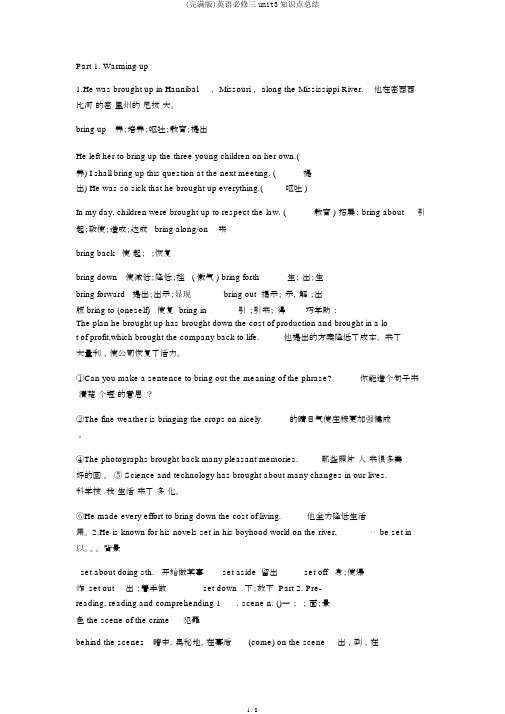
Part 1. Warming up1.He was brought up in Hannibal,Missouri,along the Mississippi River.他在密西西比河的密里州的尼拔大。
bring up养;培养;呕吐;教育;提出He left her to bring up the three young children on her own.(养) I shall bring up this question at the next meeting. (提出) He was so sick that he brought up everything.(呕吐 )In my day, children were brought up to respect the law. (教育 ) 拓展: bring about引起;致使;造成;达成 bring along/on 来bring back使起;;恢复bring down使减低;降低;挫 ( 傲气 ) bring forth生;出;生bring forward 提出;出示;显现bring out 揭示;示,解;出版 bring to (oneself) 使复 bring in引;引来;得巧学助:The plan he brought up has brought down the cost of production and brought in a lot of profit,which brought the company back to life.他提出的方案降低了成本,来了大量利,使公司恢复了活力。
①Can you make a sentence to bring out the meaning of the phrase?你能造个句子来清楚个短的意思?②The fine weather is bringing the crops on nicely.的晴日气使庄稼更加强健成。
- 1、下载文档前请自行甄别文档内容的完整性,平台不提供额外的编辑、内容补充、找答案等附加服务。
- 2、"仅部分预览"的文档,不可在线预览部分如存在完整性等问题,可反馈申请退款(可完整预览的文档不适用该条件!)。
- 3、如文档侵犯您的权益,请联系客服反馈,我们会尽快为您处理(人工客服工作时间:9:00-18:30)。
Unit 3 Welcome to our school一、重点单词、短语which, best, so, biology, geography, history, date, meeting, o'clock, OK, gate, show, around, front, building, ground, bright, modern, hall, diary, wall, pardon, phone, take,a.m., p.m., only, sure, kind, borrow, letter, few, away, best1.favourite subject 最喜欢的科目2. Open Day 开放日3.would like 想要4. the parents' meeting 家长会5.in the afternoon 在下午6. after that 之后7.at the school gate 在学校大门口8. show sb. around 带领某人四处转转9.in front of 在......前面10. On the ground floor (在一楼[英式英语]) 11.this way 这边;这种方式12. in the white shirt 穿着白色衬衫13.look at 看14. let me see 让我想想15.tell ab. about sth. 告诉某人某事16. after class 下课后17.say hello to 跟......问好18. on the phone 通过电话19.get up 起床2o. go to school 去上学21.reading room 阅览室22. all kinds of 所有种类的23.borrow ... from ... 向......借...... 24. A few 一些25.far away from 远离26. on foot 步行二、语言知识盘点(一)Comic strip - Welcome to the unit1.Which of the subjects so you like best, Eddie?【知识点1】which 的用法which 用作疑问代词,意为“哪一个”。
可用在选择疑问句中。
例如:Which city is your favourite? 你最喜欢哪一个城市?Which is your car, the black one or the red one?哪一辆是你的车,黑色的还是红色的?Which is the biggest, the sun, the earth or the moon?太阳、地球和月亮哪一个最大?2.So I can eat three! 所以我能吃三个!【知识点2】So 表原因的用法so 做连词,意为“因此,所以”。
例如:It was late, so we went home. 天晚了,所以我们就回家了。
The shops there closed so I didn't get any milk.那里的商店关门了,因此我没有买到牛奶。
【注意】so 常用来连接并列句,前一分句表示原因,后一分句表示结果;但是注意此时so 和because 不能连用。
例如:It's very cold, so I wore a heavy coat.= Because it's very cold, I wore a heavy coat..因为外边很冷,所以我穿了一件厚大衣。
3.What's the date today,Millie? 今天几号,米莉?【知识点3】询问日期的句型What's the date today? 是询问日期的常用句型,意为“今天几号?”常用答语为“It is + 日期”。
例如:——What's the date today? 今天几号?——It's 5(th) November. 11月5日。
【注意】英语中年月日的表达方式与汉语不同,一般采用日月年或月日年的顺序。
日子可写成阿拉伯数字,也可写成数字加序数词后两个字母。
4.What time is it? 几点啊?【句型分析】What time is it? 意为“几点了?”,相当于What's the time?【知识点4】what time 的用法what time 意为“几点钟”,What time...?是用来询问具体时间点的句型。
答语常为“It's + 钟点”或直接说钟点。
例如:——Excuse me, Bill. What time is it?比尔,现在几点了?——It's eight. 8点。
【易混辨析】when 与what time 区别what time 询问具体时间,如某一天的几点几分;而when 询问的时间比较笼统,不一定为具体的时间,可以是年、月、日、上午、下午、晚上等。
例如:——When is your birthday, John? 约翰,你的生日是哪一天?——It's February 6th. 是2月6日。
5.The parents' meeting begins at two o'clock in the afternoon.家长会在下午两点开始。
【知识点5】时间介词at 的用法时间介词at 常用在具体的时间点前。
例如:I usually get up at six o'clock in the morning. 我通常在早晨六点起床。
I have lunch at twelve o'clock at school. 我中午十二点在学校吃午饭。
【知识拓展】at 构成的固定短语at night 在晚上at noon 在中午at Christmas 在圣诞节at breakfast/ lunch/ dinner 吃早餐/ 午餐/ 晚餐时练习【考点1-1】疑问词辨析——T-shirt do you like best, the red one or the blue one?——I prefer (更喜欢)the red one.A. How muchB. How manyC. WhoseD. Which【考点2-1】连词的用法Because I got up very late this morning, I was late for class.A. butB. /C. so【考点3-1】询问日期的句型——What's the date today? ——.A. It's June 17thB. It's SaturdayC. It's twenty to threeD. It's fine【考点4-1】特殊疑问词(组)辨析——do you go to school? ——At 7:00.A. What timeB. How oldC. WhatD. How often【考点4-2】when 与what time 区别根据汉语意思完成句子请问现在几点了?Excuse me, is it now?【考点5-1】时间介词辨析——What time do you usually get up in the morning?——six o,clock.A. OnB. ForC. InD. At(二) Reading1. The playground is so big. 操场是这么的大。
【知识点1】so 表“如此,这么”的用法so 这里做副词,表示“如此,那么;很,非常”,常用于修饰形容词,放在形容词前,表示程度。
例如:I am so happy! 我太高兴了!It's so cold today. 今天天气很冷。
Lucy is so excited to see her old friends.看到她的老朋友们,露西非常激动。
2.Let me show you around. 让我带你四处转转。
【知识点2】show 的用法show 做及物动词,意为“给......看,把......拿给......看”。
常用结构为show sb sth = show sth to sb,意为“给某人看某物”。
但是当间接宾语为代词时,只能用show sth to sb 结构,例如:show it to me 。
例如:Could you show me the way to the post office?请你给指一下去邮局的路好吗?He showed me his new radio. = He showed his new radio to me.他给我看他的新收音机。
【知识点3】show sb around 的含义show sb around 意为“带领某人四处转转”,相当于take sb around。
后接某地时,表示“带领某人参观某地”。
例如:I'll show/ take you around so that you can meet everyone.我会带你到各处看看,好让你和大家见见面。
【知识拓展】与around 有关的动词短语look around 环顾四周travel around 到处旅行turn around 转过身go/ walk around 绕过,到处走动3.We're now in front of the classroom building. 我们现在是在教学楼的前面。
【知识点4】in front of 的用法in front of 是表示方位的介词短语,意为“在......前面”。
它的反义词是behind,“在......之后”。
例如:He is in front of me. = I am behind him. 他在我前面。
I want to take a picture in front of our school gate.我想在我们学校大门前拍张照片。
【易混辨析】in front of 和in the front of 的区别(1)in front of 意为“在......的前面”,强调在某一物体外部的前面。
(2)in the front of 意为“在......的前部”,强调在某一物体内部的前面。
例如:The library is in front of our classroom building.(在教室外)图书馆在教学楼的前面。
Tom is in the front of our classroom. (在教室内)汤姆在教室前面。
